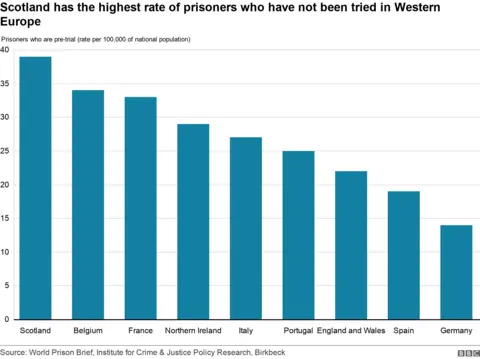People in prison awaiting trial at 'crisis' point
 BBC
BBCThe number of people in Scotland's prisons awaiting trial has hit "crisis point", according to the chairman of the Scottish Human Rights Commission (SHRC).
A quarter of Scotland's prison population has not been convicted and some people are waiting up to two years to get to court.
The SHRC said it had a direct impact on those held on remand, and victims.
Justice Secretary Keith Brown said he was working to lower the numbers.
"We have too many people on remand - I'm not hiding from that fact," he said.
The overall prison population in Scotland remained steady at just over 7,500 last year but the numbers on remand jumped 14% to an average of 1,862, the largest proportion on record.
More than half of those who spend time in prison awaiting trial are released without serving a convicted sentence.
New figures - seen by the BBC - show Scotland's rate of remand per 100,000 of the national population is higher than that of England, France, and most Western European countries.

Data obtained through Freedom of Information requests shows there are seven people behind bars untried who have been there for more than two years.
One woman in an Edinburgh prison told BBC Scotland she had been in jail on remand for 27 months. She said the "uncertainty" was the hardest thing to cope with.
Covid delays
The Covid pandemic caused a backlog in cases getting to court but experts say leaving people to languish in prison without trial serves neither victims nor prisoners.
Ian Duddy, chairman of the Scottish Human Rights Commission (SHRC), told BBC Scotland: "There is a crisis in remand in Scotland.
"There is a direct impact on the human rights of those held on remand and their families who are waiting for them to be sentenced and also the victims who are waiting for justice."
David Abernethy, the governor of HMP Edinburgh, said it was a "mystery" to him why Scotland had such a high rate of remand prisoners.
He said: "It doesn't feel to me like we are a lawless society that has to send hundreds and hundreds of people to prison in order to keep our communities safe."
The prison governor added: "It is not our responsibility who gets sent to prison on remand and who doesn't, that's for the court to decide. Obviously when people are sent here we have to manage them as best we can."
Losing everything
Rachel, not her real name, has been on remand in HMP Edinburgh for 11 months. She still does not know when she will be going to court.
"People aren't even guilty at this point and they're losing absolutely everything," she told BBC Scotland.
Rachel said people lost their homes, their children and jobs while they were in prison awaiting trial.
She said many women, including herself, had pleaded guilty even when they were innocent because they knew they would get home sooner.
"I tried this last year and it actually went through so I know through personal experience as well," Rachel said.

Nicola Henderson, who had just been released from HMP Edinburgh, said she felt fortunate to have been sentenced before being sent to prison unlike many women she met who were on remand.
"Some of them have been on remand for two years - it's the unknowing," she said. "At least I came in knowing what date I was going to get out."
George Sutherland spent years in prison as a convicted inmate and on remand.
He said the uncertainty of remand was far harder to endure.
George now works with the charity Heavy Sound in HMP Edinburgh to try to help other prisoners on remand turn around their own lives.
"There's one woman who's been on remand for 25 months and I find that shocking," he said.
"In this country it is supposed to be innocent until proven guilt, but it's the opposite - you're guilty until proven innocent."

George said prisoners on remand did not have the same rights as sentenced prisoners.
"Being sentenced you're allowed to have a job and you get a wage and you get access to services and all the different things - like gym and things," he said.
In contrast, remand prisoners can be locked up for 23 hours a day, which has a terrible effect on their mental health.
George said remand should only be used when there was a risk to the public and not for "petty crime".
The chief inspector of prisons, Wendy Sinclair Gieben, said she normally avoided "hyperbole" but recently wrote to the parliamentary justice committee to say that she was concerned "too many people are being held in custody for prolonged periods of time, some of whom may not be found guilty of an offence".
'Legally innocent'
Helen Fair, research fellow and World Prison Brief researcher at Birkbeck, University of London, said: "If countries are holding people untried for months or even years then we need to be able to look at why that is.
"Nearly 30% of Scotland's prison population is untried.
"These people are legally innocent."
Scotland's justice secretary said he was working on a new Bail and Release from Custody Bill to restrict the use of remand to cases where it was absolutely required for public safety.
He said he agreed with opposition parties that there were too many people on remand and it needed to reduce.
Keith Brown said: "I've asked them to come forward with their suggestions as to how we do this, but we have these plans in place, we'll be debating this as the bill comes before parliament and we'll be increasing the opportunities for electronic monitoring and community disposals, rather than keeping people in custody."
Scottish Conservative justice spokesman Jamie Greene MSP, said the "damning" stats highlighted the real-life impact of the enormous backlog in court cases that the Scottish government was presiding over.
"The way to reduce the remand population is simply to get a move on with processing the huge volume of trials in the system, not to tie the hands of judges and sheriffs with controversial plans to release people on bail who they believe should be in custody," he said.
